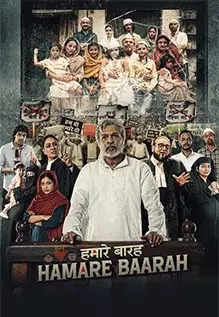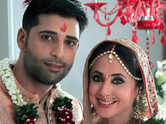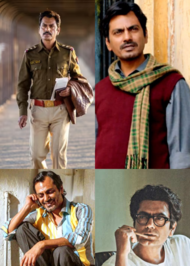
Synopsis
While the film’s core theme centers around women empowerment and challenges toxic male patriarchy, it often veers into a narrative that feels more like advocacy than entertainment.
Read MoreCast & Crew
Hamare Baarah Movie Review : A high-pitched social drama blunted by loud theatrics
Critic's Rating: 2.5/5
Story: A young woman goes to court against her own father to help her stepmother terminate a very risky pregnancy that could be fatal. Will justice be served?
Review: Mansoor Ali Khan Sanjiri (Annu Kapoor) is a 60-year-old devout Muslim with extreme views about the way women and children in his household should lead their life. He has married multiple times and has fathered as many as eleven children with a twelfth one on its way. However, this pregnancy is extremely risky and can cost his young wife Rukshar (Ishlin Prasad) her life.
But for Khan Saab this risk isn’t even worth considering because as per him children are God’s blessings and aborting a child under any circumstance is blasphemy. Apart from his older son Shahnawaz (Paritosh Tripathi), his entire family is against Khan Saab’s authoritarian ways, but none of them have the courage to stand up against him. Until one day, when his daughter Alfia (Aditi Bhatpahri) musters the courage to approach a fiery woman lawyer Afreen (Ashwini Kalsekar) to get a court order to let Rukshar abort the unborn child.
The first half of the film is spent in setting up the characters and the story underlining the deeply problematic family dynamics within the Sanjiri household. Despite a lot of characters entwined in the narrative, director Kamal Chandra and writer Rajan Agarwal stay on course with the story. Khan Saab’s orthodox and unpopular views and actions drive the narrative forward and it reaches a flash point by intermission, after which, the film becomes a loud courtroom drama. Those sequences verge on repetitiveness, diminishing their impact.
The story squarely portrays Khan Saab as the villain, who despite overwhelming resistance from his family, continues to force his views on them. The man is portrayed as a misguided monster, who will stop at nothing in doing what he believes in, in the name of religion. And actor Annu Kapoor portrays it with a jarring loud tone that gets overbearing quite early on in the film. But his rich urdu dialect is pitch-perfect. Women are reduced to sobbing sorry figures, without agency except Alfia (Aditi Bhatpahri), who plays her part well. The courtroom scenes have some moments of high tension and impact but Chandra chooses loud theatrics over subtle storytelling here. While Ashwini Kalsekar is impressive as the straight-talking prosecutor Aafreen, Manoj Joshi comes across more like a caricature devoid of realism. The half-baked love story between Alfia and journalist Danish (Parth Samthan) is an unnecessary distraction, much like the film’s extremely forgettable music score (by Annu Kapoor). The narrative's religious undertones sometimes overshadow its broader message.
While the film’s core theme centers around women empowerment and challenges toxic male patriarchy, it often veers into a narrative that feels more like advocacy than entertainment.
Review: Mansoor Ali Khan Sanjiri (Annu Kapoor) is a 60-year-old devout Muslim with extreme views about the way women and children in his household should lead their life. He has married multiple times and has fathered as many as eleven children with a twelfth one on its way. However, this pregnancy is extremely risky and can cost his young wife Rukshar (Ishlin Prasad) her life.
But for Khan Saab this risk isn’t even worth considering because as per him children are God’s blessings and aborting a child under any circumstance is blasphemy. Apart from his older son Shahnawaz (Paritosh Tripathi), his entire family is against Khan Saab’s authoritarian ways, but none of them have the courage to stand up against him. Until one day, when his daughter Alfia (Aditi Bhatpahri) musters the courage to approach a fiery woman lawyer Afreen (Ashwini Kalsekar) to get a court order to let Rukshar abort the unborn child.
The first half of the film is spent in setting up the characters and the story underlining the deeply problematic family dynamics within the Sanjiri household. Despite a lot of characters entwined in the narrative, director Kamal Chandra and writer Rajan Agarwal stay on course with the story. Khan Saab’s orthodox and unpopular views and actions drive the narrative forward and it reaches a flash point by intermission, after which, the film becomes a loud courtroom drama. Those sequences verge on repetitiveness, diminishing their impact.
The story squarely portrays Khan Saab as the villain, who despite overwhelming resistance from his family, continues to force his views on them. The man is portrayed as a misguided monster, who will stop at nothing in doing what he believes in, in the name of religion. And actor Annu Kapoor portrays it with a jarring loud tone that gets overbearing quite early on in the film. But his rich urdu dialect is pitch-perfect. Women are reduced to sobbing sorry figures, without agency except Alfia (Aditi Bhatpahri), who plays her part well. The courtroom scenes have some moments of high tension and impact but Chandra chooses loud theatrics over subtle storytelling here. While Ashwini Kalsekar is impressive as the straight-talking prosecutor Aafreen, Manoj Joshi comes across more like a caricature devoid of realism. The half-baked love story between Alfia and journalist Danish (Parth Samthan) is an unnecessary distraction, much like the film’s extremely forgettable music score (by Annu Kapoor). The narrative's religious undertones sometimes overshadow its broader message.
While the film’s core theme centers around women empowerment and challenges toxic male patriarchy, it often veers into a narrative that feels more like advocacy than entertainment.
No showtimes available
Popular Movie Reviews
Next Movie Review







































































































































 Kamal ChandraDirector
Kamal ChandraDirector Annu KapoorActor
Annu KapoorActor Ashwini KalsekarActor
Ashwini KalsekarActor Manoj JoshiActor
Manoj JoshiActor Rahul BaggaActor
Rahul BaggaActor Parth SamthaanActor
Parth SamthaanActor




















0/5